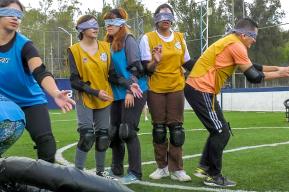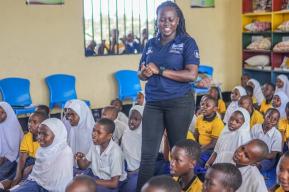Worldwide an estimated 246 million children experience school-related violence every year. School-related gender based violence (SRGBV) negatively affects school performance and can lead to school drop-out, especially when the school environment is not perceived as safe for learners. It is being increasingly recognized as a major obstacle to the achievement of quality education for all children.
UNESCO’s “School Violence and Bullying: Global status report” released in March 2019, covered 144 countries and has highlighted that bullying and physical violence affects about one in three children around the world. This has an adverse impact on the mental and physical health and well-being of the child.
A Study by the Ministry of Women and Child Development, in 13 different states in 2007, found that 50% of the children had faced emotional abuse and 69% had been subjected to physical abuse. Moreover, another study conducted by the National Commission for Protection of Children's Rights in 2009 and 2010 found that corporal punishment was nearly universal in schools. Out of the total of 6,632 children across seven states, only nine children reported not having had received any kind of punishment defined as getting beaten by a cane, being slapped on the cheeks, being hit on the back or being boxed on the ears.
UNESCO carries the distinction of being the specialized nodal agency for spearheading efforts towards attainment of Sustainable Development Goal 4 (Quality Education). Recently, the Executive Board of UNESCO had unanimously signed up to the first ever UN decision, “Learning without Fear”, condemning gender-based violence in all its forms and manifestations. Countries committed themselves to design and implement national policies and action plans; and to promote the creation of safe, non-violent, inclusive and effective learning environments for all boys and girls.
Ensuring all children and young people have access to safe, inclusive, health-promoting learning environments is a strategic priority for UNESCO.
The UNESCO New Delhi office has developed a poster titled “Learning without Fear” covering a wide range of scenarios related to SRGBV and possible responses to address it in the school setting. Institutions of national repute like National Council of Educational Research and Training (NCERT), the Central Board of Secondary Education (CBSE) and the National Commission for Protection of Child Rights (NCPCR), a statutory body under the Ministry of Women & Child Development, Government of India have endorsed the poster.
With education as her armour, Darji (final year student of Amarbharti Vidyalaya School in Gujarat, India) believes she can conquer gender-based violence, a menace that prevents millions of school children from fulfilling their dreams.
The poster is available in four languages - English, Hindi, Gujarati, and Tamil. A number of School Education Departments have got the poster translated into the local languages and disseminated it across schools in different states of India.
Related links:










